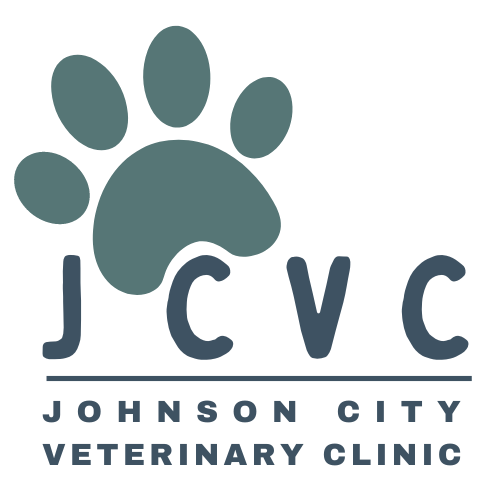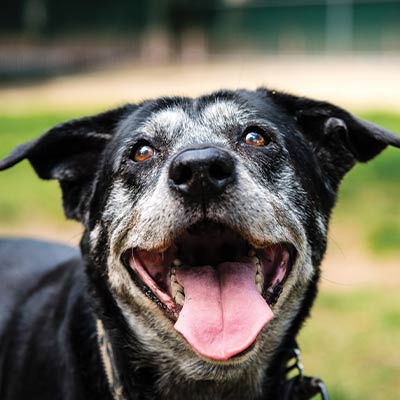
Canine Care
213 Hwy 281 South – Unit C
Johnson City, TX 78636
(830) 225-1095


Our Approach to Canine Wellness
Annual or bi-annual primary and wellness care are essential for all ages of dogs because they help prevent diseases, detect health issues early, and ensure a longer, healthier life. Regular check-ups, vaccinations, parasite prevention, and professional dental care can detect problems before they become serious illnesses, reducing your veterinary costs and improving your pet’s quality of life. Wellness care also gives us the opportunity to provide guidance on nutrition, behavior, and aging, keeping your dog happy and active throughout their lives.
At Johnson City Veterinary Clinic, we are a full-service veterinary clinic and offer all of the primary and wellness care veterinary care for dogs, including:
- Wellness Exams – Thorough check-ups to assess your pet’s overall health.
- Vaccinations – Protection against diseases like rabies, distemper, and parvovirus.
- Parasite Prevention – Flea, tick, and heartworm prevention.
- Dental Care – Teeth cleaning, exams, and extractions if needed.
- Spay/Neuter Services – Surgical sterilization to prevent unwanted litters and health issues.
- Microchipping – Permanent identification for lost pets.
- Nutritional Counseling – Guidance on diet and weight management.
- Skin and Allergy Treatment – Diagnosis and management of dermatological conditions.
- Bloodwork and Diagnostics – Routine lab tests to detect early health problems.
- Senior Pet Care – Age-specific screenings and joint health management.
- Behavioral Consultations – Help with anxiety, aggression, or other issues.
- Emergency and Urgent Care – Treatment for sudden injuries or illnesses.
We love puppies at Johnson City Veterinary Clinic!
Puppy veterinary care involves a series of health check-ups, vaccinations, and preventive treatments aimed at ensuring the well-being of young dogs during their critical developmental stages. At Johnson City Veterinary Clinic, we offer all types of puppy care, including:

Initial Health Check-Up
Please bring your puppy to us as soon as possible so that we can be sure your puppy is healthy!
- Physical Examination: We will give your puppy a thorough physical examination to assess the overall health of your puppy. Our veterinarian checks for congenital issues such as heart murmurs and hernias, signs of illness & parasites as well as developmental progress.
- Baseline Testing: Initial tests to check for common health issues such as intestinal parasites, ear mites, and fleas.
Vaccinations
- Core Vaccinations: Essential vaccinations to protect against common and potentially serious diseases.
- Distemper – a virus that can cause seizures, GI upset, and respiratory disease as well as teeth abnormalities.
- Parvovirus – causes the gastrointestinal tract lining to slough and puppies have vomiting and diarrhea which leads to low blood sugar, hypothermia, and sepsis.
- Rabies-An incurable viral infection affecting the neurologic system.
- Leptospirosis-a bacterial infection that can affect all mammals, including pets, varmints and people.
- Adenovirus- a viral infection affecting the liver, also known as hepatitis.
- Parainfluenza– a viral respiratory infection.
- Non-Core Vaccinations: Additional vaccines based on lifestyle and risk factors, such as Bordetella (infectious tracheobronchitis) or Rattlesnake vaccine.
Deworming
- Initial Deworming: Puppies often receive deworming treatments to eliminate intestinal parasites.
- Follow-Up Treatments: Regular follow-up deworming schedules to ensure your puppy remains parasite-free.
Heartworm and Flea/Tick Prevention
- Flea and Tick Prevention: Treatments to prevent infestations of fleas and ticks, which can cause discomfort and transmit diseases.
- Heartworm Prevention: Medications to protect against heartworm disease, which is transmitted by mosquitoes and can be fatal if untreated.
Spaying / Neutering
Spaying or neutering your young pet is so important to help prevent overpopulation, reduce the risk of certain cancers, minimize behavioral issues, and contribute to longer, healthier lives for pets.
- Surgical Procedure: As long as your pet is at least 4 months of age and 2lbs, they can be spayed or neutered to prevent unwanted pregnancies and reduce the risk of certain health issues such as breast cancer and prostate swelling, causing the inability to urinate and defecate.
- Post-Operative Care: Instructions for post-operative care to ensure proper healing and recovery. Stitches are buried under the skin so you do not have to return to have them removed. Keeping them quiet for 1-2 weeks after surgery allows the incision to heal. No bathing, grooming, or rough housing for two weeks.
Nutrition and Diet
To avoid gastric upset to your puppy, please keep your puppy on the same food he or she is being fed by the breeder until your puppy’s first visit with us.
- Dietary Recommendations: Guidance on appropriate nutrition for puppies to support healthy growth and development. For example, if large breed puppies are fed appropriately, they have a 50% less chance of getting hip dysplasia which is a painful and lifelong disease process.
- Feeding Schedule: Recommendations for feeding schedules and portion sizes.
Behavioral and Training Guidance
- Behavioral Assessment: Early evaluation of behavior and temperament.
- Training Tips: Advice on basic training, socialization, and addressing common behavioral issues.
Regular Check-Ups
Ongoing Health Monitoring: Regular veterinary visits to monitor growth, update vaccinations, and address any emerging health concerns.
Taking these steps can help ensure that your puppy lives a long, healthy life with you and your family. Call or email us today to schedule your puppy exam and we would be happy to help!
At Johnson City Veterinary Clinic, senior pets rock!
Caring for a senior pet involves taking special measures to ensure the health, comfort, and well-being of pets as they age. Just like humans, pets require different care routines and medical attention as they get older. Our goal is to help your senior pet live as long and as comfortable as possible. Here are some key aspects of we recommend for senior pet care:

Monitoring and Early Detection
Your daily observations of your aging pet are critical to their comfort. If you notice anything unusual, please give us a call to schedule an appointment.
- Behavioral Changes: Keep an eye out for any changes in behavior, appetite, or activity levels, as these can be signs of underlying health issues.
- Pain Management: Discomfort, slow to get up and lameness may be some of the top issues that pet owners notice about their aging pet. We can assist you to keep your senior pet comfortable, through weight loss plans, over the counter recommendations for pain/joint support, oral daily pain medications, and even Adequan & Librela injections to alleviate pain.
Veterinary Check-ups
- More Frequent Visits: Older pets benefit from more frequent veterinary visits so that we can monitor their health closely. If any new lumps/bumps arise, it is best to have them checked sooner rather than later.
- Blood Tests and Screenings: Regular blood work and screenings can help detect conditions like kidney disease, liver disease, diabetes and even cancers earlier than without tests/screens. Heart disease and arthritis are easier to manage and can extend a baby’s life and comfort level when detected earlier.
Dental Care
Regular Cleaning: Dental health often declines with age, so regular teeth cleaning and check-ups are important to prevent periodontal disease and other dental issues which can lead to sinus infections. If your pet seems to be eating less, chewing on one side of their mouth, dropping food when they chew, or refusing to eat, they may have tooth or mouth pain due to periodontal disease. Call us for a dental exam if you see your pet exhibiting any issues with appetite or eating.
Diet and Nutrition
- Special Diets: Senior pets may require diets tailored to their age, health conditions, and nutritional needs. This might include food that’s easier to digest, lower in calories, or enriched with specific nutrients. If liver disease is detected early, then a diet change can prevent seizures! A cardiac diet lower in sodium can help prevent fluid in the lungs and congestive heart failure.
- Weight Management: Just like humans, maintaining an ideal weight is crucial to prevent obesity-related diseases and keeping your pet physically comfortable and off of pain medications for as long as possible. Sometimes weight loss is key to tipping us off that there is an underlying problem. Some people think, oh, they are older and slowing down/eating less when in reality, maybe their mouth hurts due to periodontal disease or they have kidney disease and toxins are building up their body causing them to not have a good appetite. If you suspect weight loss, please call us right away!
Exercise and Mobility
- Appropriate Exercise: While older pets still need exercise, the intensity and type might need to be adjusted to suit their reduced energy levels and potential mobility issues.
- Mobility Aids: Items like ramps, orthopedic beds, and joint supplements can help pets with arthritis or other mobility problems.
Mental Stimulation
Cognitive Health: Mental exercises, toys, and interaction are essential to keep an older pet’s mind sharp and reduce the risk of cognitive decline.
Comfort and Environment
- Comfortable Living Spaces: Ensure that the pet’s living area is easily accessible and comfortable, with cozy bedding and a quiet space to rest.
- Routine and Familiarity: Maintaining a consistent routine can help reduce stress and anxiety in senior pets.
Grooming and Hygiene
- Regular Grooming: Older pets might need more help with grooming to keep their coat and skin healthy.
- Bathing and Skin Care: Regular baths and skin checks can prevent issues related to dryness or infections.
Taking these steps can help ensure that your senior pet enjoys a comfortable, healthy, and happy life in their later years. We would love to assist you in caring for your senior pet! Please call or email us to schedule an appointment so that we can answer all of your questions and concerns.

